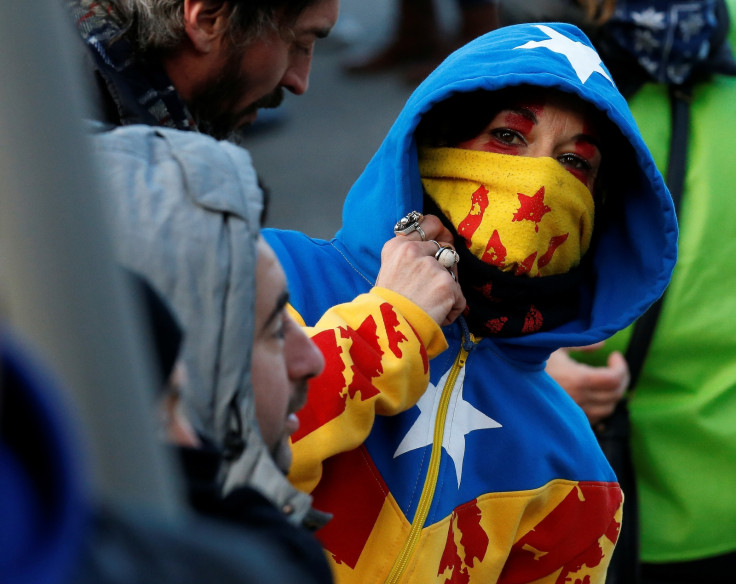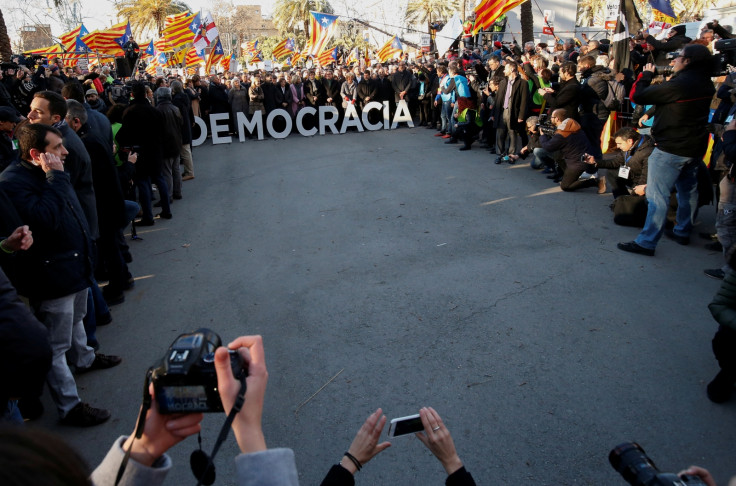Britain had Brexit – now it is Catalonia's turn to decide its own future
Catalans could follow Quebec and hold a referendum on independence without Spain's permission.

This week saw a new escalation in the increasingly deteriorated relationship between Catalonia and Spain. While the Catalans continue to insist on mass mobilisation and strictly non-violent democratic action in order to have a binding, official referendum on independence, Spain's only answer to date has been "No".
Spain refuses to allow a binding referendum, a non-binding referendum, and this week brought former President Artur Mas and two ministers to court on charges that he had facilitated a "participatory process" which sought the opinion of the Catalan people on independence, for which he faces a 10 year ban on holding public office. Fifty thousand outraged Catalans joined the President and his two ministers at 8am on a Monday morning on his walk to the courthouse, demonstrating once again their capacity and willingness to show their support en masse and in person.
Spain's heavy-handedness is counterproductive (for them) at best. Who wants to stay in a relationship by force? Who wants to be continually told that their voice is unimportant, that they have no right to vote on their own political future?
Indeed it was just this point that brought the Americans to favour independence from Britain in the 18th century: they resented having legislation being imposed on them without representation. Spain has consistently used a politicised Constitutional Court to overturn Catalan laws while it ignores Constitutional Court rulings in favour of Catalonia.
Even on a personal level, it's not hard to understand. Being forced into a relationship, and not allowed to leave it, or even say that you'd like to think about leaving it, is not a good foundation. It does not encourage trust or mutual respect. Indeed it indicates insecurity on the part of the party who insists on the status quo – leading them to be ever more dismissive of the other's interests and differences, while it fosters frustration in the party who would simply like to be heard, and who may feel that they need to underscore their differences in order to win that right to voice their opinion.
There are many, many Catalans who insist on the right to vote in a referendum not for economic or identity reasons but simply for dignity, because they believe, like the United Nations Charter of Human Rights says, that every people has the right to decide its own government.
Thus, it is not surprising that in Catalonia, a full 80% of the population is in favour of holding a binding referendum on independence, and that 60% of these want a referendum even if that means disobeying Spanish law to hold it. There is even a substantial number of unionists who want to vote in a referendum. It's time to settle this question in a democratic way once and for all.
The massive, non-violent demonstrations – on the order of 20% of the population, some 1.5 million people, each year for the past five years – precisely to demand this right to vote, has put the referendum on the table, has ushered in a pro-independence majority in parliament, and given the president the necessary mandate so that he could promise to hold a binding, official referendum before the end of September this year. Not only that, the president has promised to hold the referendum with or without Spain's permission, and to declare independence when the referendum wins more than 50% + 1 of the votes.
Catalonia wouldn't be the first to hold a unilateral referendum, Quebec did it in 1995.
What does this have to do with Brexit? Brexit had a similar foundation: wanting to decide how to govern oneself without the intervention of foreign powers, but with a xenophobic, insular attitude. This is where the two movements greatly differ. Catalonia has no interest in isolation, it has no interest in building a wall to keep people in or out. In fact there is a strong Welcome Refugee movement that has been frustrated by the Spanish government's dragging its feet.
Before a meeting last Friday in Tortosa to collect signatures for the "Our house/Your house" movement was packed. Not only that, it was packed with greying 60-somethings, who perhaps had first hand memories of the exiles of their own parents and grandparents, but who also are vocal about their desire to be part of Europe, part of the world, to exercise responsibility and solidarity with that world, while still maintaining local control over what priorities for local governance.

What is next? There are only two options: Spain can continue on its current path of refusing to talk to Catalans, opting instead to bring them to court to silence and intimidate them. There are currently some 400 cases before the Spanish courts, on independence related issues, ranging from the "crime" of hanging a pro-independence flag from the city hall, to allowing a vote in the Catalan Parliament to accept the recommendations for how to proceed on independence from the already established Constituent Process committee.
For this last offence, Catalan Parliament President Carme Forcadell could face jail time. It is no wonder that on the day she gave testimony in court, there were declarations in her defence from aghast democratic politicians all over Europe. If Spain continues to refuse to listen to Catalans, they will simply move forward on the basis of the democratic legitimacy of the highest turnout in Catalan Parliament history. In this case, we will see three "laws of disconnection": defining the tax agency, social security administration and transitional jurisprudence, including an electoral law, which will form the basis of the Catalan legal system during the system, and which will allow the referendum to be held in an official, binding fashion.
Democrats everywhere should celebrate Catalans' tenacity and be guided by their example.
Catalonia wouldn't be the first to hold a unilateral referendum, Quebec did that in 1995. Spain has gone so far as to threaten to close the schools used as electoral colleges, but this only indicates its desperation and lack of control, since there are many other Catalan government buildings that could be used for the vote. The Catalan president has declared in the Catalan parliament, the European parliament and to an audience of foreign consuls in Barcelona that a majority vote in favour of independence must be respected by immediately declaring independence.
Spain's only other option is to negotiate a referendum, just as David Cameron did with Scotland in 2014. This is clearly the best option for Spain as it would allow a No campaign to better articulate just why Catalonia should stay. It would have the added benefit of allowing Catalans to be explicit about why they want to leave, that is, it would give Catalonia the voice that it has been so determined to have. It would also ensure the resolution of the issue either way: independentists have promised to abide by the results, and in the case of a Yes result, it would facilitate a democratic, calm, ordered transition that would be in the interests of Catalonia, Spain, and Europe.
There has been no more democratic citizen-led process than Catalonia's independence movement. Begun by citizens fed up with the frustrated improvements to the Statute of Autonomy in 2006 and the court ruling that further watered that charter down in 2010, the Catalan independence movement is a model of democratic, non-violent, creative and even cheerful activism, evidenced by massive demonstrations, candle lightings, bike rides, conferences, debates, videos, books, balloons, and much more, mobilising huge numbers of the population.
Indeed it is a perfect example of democracy in which individual citizens have demanded that their political representatives listen to them, and then fulfil their requests. Democrats everywhere should celebrate their tenacity and be guided by their example.
Liz Castro is a writer and publisher. She recently published "Many Grains of Sand: A source book of ideas for changing the world, tried and tested in Catalonia". Follow her on Twitter at @lizcastro.
© Copyright IBTimes 2025. All rights reserved.






















